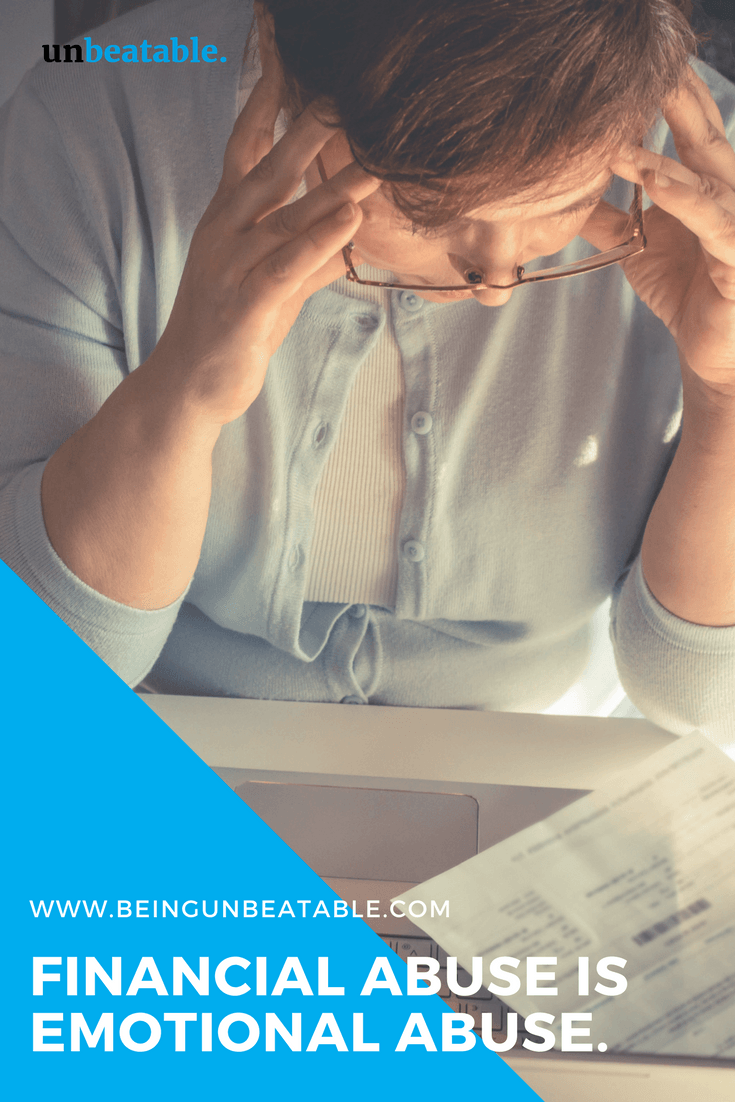Financial abuse is emotional abuse. What can I do?
Financial abuse is emotional abuse. Take this woman I once worked with, a kind and lovely friend.
Her husband never worked. He was fit and healthy and had no reason not to. It was his choice and there’s nothing wrong with that. Many couples reverse the traditional role models.
But, what used to bother me was no matter how hard my friend work, it was never hard enough.
She’d work long hours, weekends and Bank holidays. She bought their house and was paying off their mortgage. All the bills were in her name. If ever, exhausted, she took one day off, her husband scolded her for her lack of ‘work ethic’.
She felt guilty if she bought herself the occasional Cappuccino. When I asked why, she explained she had to show him receipts, to account for every little penny she spent. Then he’d admonish her for it for overindulging in her spending. At the same time he was buying top of the range computers, for his simulated airplane flying games.

Financial abuse is domestic abuse
Financial abuse is one of the lesser talked about forms of domestic abuse. It might be excessive control over money, or your partner not allowing you to work. Or, putting all the bills into your name.
[bctt tweet=”Financial abuse is a manipulative form of emotional abuse or coercive control.” username=”vivian_mcgrath”]
Some of the signs you are experiencing economic abuse are these:
Tracking your spending
Like my friend, this is when every penny must be accounted for. Punishments may be dished out if they deem you to be over-spending. Such as your budget being reduced, which forces you to beg for money. This is a way to isolate and control you.
They have total control
Your partner is in total control of all finances. You rely on them for your very existence and often it’s hand-to-mouth. If you are the one who works, you are expected to handover your pay cheque.
Whilst you are only allowed a small housekeeping allowance, they may even have a separate bank account of their own. This puts you in a position of total dependence. You are trapped and financially unable to get out.
Giving permission for you to work or not
Women in financially abusive relationships are often forced to give up their careers, or take jobs they wouldn’t have normally chosen.
It may be expecting you to be a stay-at-home parent, when you’d rather go to work. Or working part-time and only with permission from your partner.
This keeps you from the financial independence and stability which might offer you the chance to leave them.
Threats Of Leaving
This is a manipulative form of coercive control. Knowing you are unable to support yourself, your partner threatens to leave you or denies you financial support. Unable to survive without this you stay and control is established once more.
It doesn’t surprise me that homelessness in middle aged women is on the rise. Many have suffered emotional, even physical abuse and are left penniless when they leave the relationship.
Everything is in your name
Your partner does nothing, yet controls everything financially. But they never pay a bill, as all utilities, even mortgages, are in your name.
You are forced to work harder to afford the payments, as all the bucks stop with you. You may even be saddled with debts that have been built up by an abusive partner, set against your name.
Perennially pregnant
Some women are coerced into falling pregnant and having more and more children. With the birth of each child, the cost of childcare becomes prohibitive, leaving her unable to return to work, even if she wanted to.
Her role is to care of her partner and the children, whilst not being granted financial freedom or independence. Her survival depends on him.
Even when a survivor has left the home, financial control can still be exerted by the abuser with regard to child maintenance.
Financial abuse. What can I do?
- Open your own secret bank account. Stash every penny you can. Ask friends and family for help, you can pay them back once you’re on your feet again.
- Educate yourself online. Get vocational training, skills or even a degree, to prepare yourself for a job when you later need it.
- Get a secret job. Pretend you are volunteering, or babysitting whilst they’re at work. Or find a job you can do online, from home.
- Establish your credit rating. Get a secured card that you keep securely stored away from your home, say with a trusted friend. Use it to make some purchases, to build your credit.
- Research all options with regards to housing and financial assistance and other community-based services. Get help and support: see domestic abuse resources
- Remember you are not to blame. There is nothing to feel ashamed of.
Are you experiencing financial abuse? Does your partner control you through money? Let me know in the comments below.


Trackbacks/Pingbacks